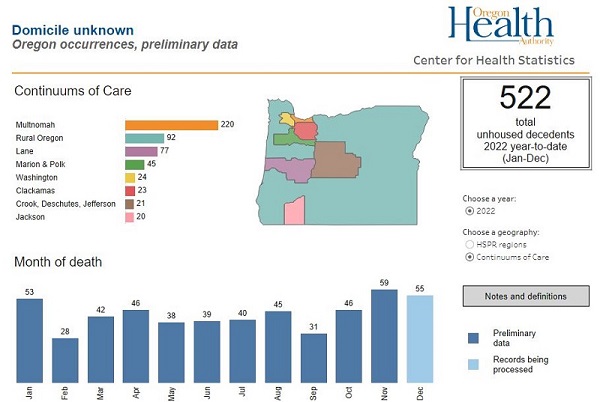Our policy decisions are resulting in homelessness and preventable deaths
5 min read
Julie Lambert: You’re listening to 97.3 FM LP, KEPW, Eugene’s Resistance Radio.
[00:00:08] Recently here in Eugene, we honored our homeless that have passed away due to, in part, their homelessness. National Homeless Persons Memorial Day takes place each year on the longest night of the year, the winter solstice. It’s usually Dec. 21.
[00:00:27] During the candlelight vigil, Heather Marek spoke about the current state of homelessness in Eugene. Heather’s a staff attorney with Oregon Law Center where she works on housing and homelessness. In addition, she’s a human rights commissioner. She gave a short speech at the memorial, and I would like to share it with the community because it gives a good update on what are we doing and what is the state right now of our homeless population.
[00:00:59] Under a new Oregon law, counties must track and report deaths of homeless individuals. Those reports, which Oregon Health Authority compiles, are neither perfect nor complete, but they do provide some important information. They tell us that from January through October of this year (2022), 393 unhoused Oregonians passed away.
[00:01:21] Most of those individuals were on the street when they took their last breath. The data shows that Oregonians experiencing homelessness died at a rate 2.5 times higher than that of the general population. It also reveals that Black Oregonians were more than twice as likely as white Oregonians to die homeless.
[00:01:41] And Indigenous Oregonians were three times as likely, and we know that 57 residents in Lane County died while experiencing homelessness in the first 10 months of the year. Research reveals that homelessness, health, injury and death, these are just not just private personal problems. These issues do not occur in a vacuum.
[00:02:04] They are matters of public policy, the logical conclusion of policy decisions.
[00:02:09] These are what experts call social determinants of health. That is, the conditions in the environment where we live that shape and determine our quality of life and well-being, and to a great extent, how and when we die. So rather than ask what these individuals did to deserve dying on the streets of Eugene, we should instead ask what policies made their deaths possible and likely. Research shows that housing is a social determinant of health and that the single most significant predictor of homelessness is the lack of affordable available housing.
[00:02:46] In Eugene, there is simply not enough housing for the number of people and residents cannot afford units that do exist. At any given time, around 2% of rental housing units are available for renters to compete over. That drives up the prices. By some estimates, the typical house, the typical cost of a one-bedroom apartment is $1,700.
[00:03:08] Meanwhile, one in five Eugenians lives in poverty. That means earning a little more than $1,000 a month. Unsurprisingly, most Eugene renters pay more than they can afford, and the overwhelming majority of evictions occur because tenants cannot make their rent. Most people who become homeless in Eugene were previously housed in Eugene.
[00:03:31] When Eugenians lose their housing, there is little to no safety net. Almost 5,000 people are experiencing homelessness in the county, three quarters of whom reside in Eugene, but there are only shelter beds to accommodate 11% of those people. Another 11% of people can stay at sites that allow them to pitch a tent, park a vehicle, or live in a Conestoga hut or shed. But that leaves 78% of unhoused people who have nowhere to go.
[00:04:01] Under the camping ban, there is not a square inch of the city where a person can legally sleep, shelter in a tent, or use a blanket or sleeping bag to stay warm and dry. People who engage in those acts of survival face citation, arrest, prosecution, fines, and jail time. We are in a humanitarian crisis that the city responds by punishing the people who have the least power to do anything about it. And who are suffering and who are the most vulnerable is a policy decision and it is a dangerous one.
[00:04:30] Criminalizing people for trying to engage in acts of survival makes our community less healthy and less safe. It leads to citations, arrests and convictions, which in turn result in more jail time, fines, debts, poor credit, and criminal records that make obtaining housing, employment, and stability all the more difficult.
[00:04:54] Criminalization actually puts people in danger of serious physical harm. First, Eugene Police frequently seize belongings essential for survival when enforcing anti-homeless laws and sweeping camps. Criminalization also isolates unhoused people from their providers and community and from public locations of safety.
[00:05:15] Police routinely ban people from all the parks and open spaces for violating anti-homeless laws. This displacement disrupts crucial services and it pushes people into locations where they’re alone and predated upon.’ She says, ‘I have personally known people who have been victims of violence after being moved along by police, and the negative interactions with police itself creates fear and distrust preventing unhoused crime victims from seeking refuge in the justice system when they need it.
[00:05:47] Finally, persistent scapegoating of unhoused people fuels fear, stigma, hate, and violence. Homelessness is regularly conflated with crime, drugs, danger, trash, feces, filth, pests, environmental harm, urban decay, and every other ominous threat. And after years of hysteria and dehumanization, we act surprised when neighbors call the cops every time that they see someone sleeping in a tent.
[00:06:12] And we act surprised when a business owner douses an unhoused woman with water as she sleeps in the cold night. And we act surprised when someone drives their vehicle into a camp. But these are not random, unpredictable incidents. In 2019, the American Medical Association adopted a policy opposing laws that criminalize individuals experiencing homelessness for carrying out life-sustaining activities like sitting and sleeping.
[00:06:38] The AMA stated that stable, affordable housing is essential to the health of individuals, families, and communities, and it voiced support for policies that preserve and expand affordable housing options.
[00:06:59] Recently, a coalition comprised of 19 federal agencies, including the U.S. Department of Housing and Urban Development, the VA, Health and Human Services, and the Department of Justice issued a plan, which clearly states that housing is a social determinant of health, and the lack of housing contributes to illness and premature death. The plan emphasizes that housing is essential health care and it outlines the critical need for additional affordable housing and the importance of using strategies that are proven to work, like ‘Housing first.’
[00:07:21] Also, the plan identifies criminalization of the homelessness in particular as a key challenge and barrier to reducing homelessness because it takes away resources from constructive solutions, and it imposes financial burdens and criminal records upon individuals who are disproportionately people of color and people with disabilities.
[00:07:45] And she finishes with this: ‘To prevent unnecessary death, we need housing, not handcuffs. That is how we can meaningfully honor those that we have lost.’ We will continue to bring updates on the state of houselessness in Lane County.







